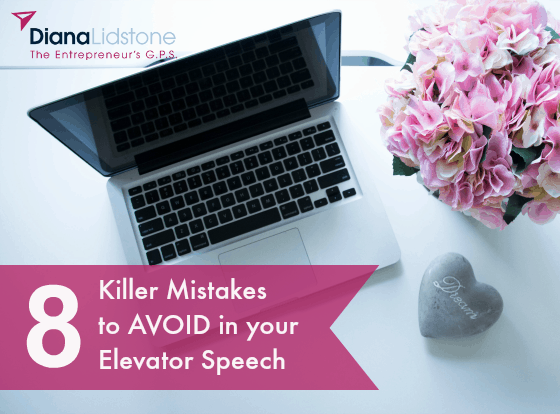
Introducing yourself quickly & effectively can sometimes feel awkward. You don’t want to bore the person; you don’t want to come across as salesy but you do want to start a conversation (not end it!).
With some practice, you can avoid the following mistakes. Are you making any of them? Do you hear them being made by others?
1. Speaking ‘expert jargon’
When you’re introducing yourself, it’s easy sometimes to slip into ‘expert speak’ or the language of your industry. Your industry language can be very confusing to the general public. An accountant talking about depreciation, P&L statements, etc. will soon end a conversation. Even if you’re a coach, there is jargon such as empowerment, limiting beliefs, energetic blocks. If you use these in your elevator speech, you lose the risk of confusing the person you’re speaking to. Keep your language simple — so that a 7 year-old can understand.
2. Omitting mentioning your target audience
Your elevator speech should mention your ‘dream client’ so that they can easily identify themselves in your introduction. Also if you use terms that are easily identifiable, it makes it much easier for someone to remember you and to refer clients to you. For instance, if you work with busy professional women — this is an easily identifiable target audience.
3. Using the word ‘you’
In sales copy, the word ‘you’ is great and highly recommended. However, when you are delivering your elevator speech to one person, or a small group, saying ‘I can help you …” may seem a little forward. Instead, use the 3rd person – for example, ‘I help coaches who are …’
4. Using the words “I am a ….”
I call these the 3 deadly words because they are a true conversation STOPPER. I’m a real estate agent; I’m a financial advisor; I’m a lawyer. The problem is that most of us think we know what these people do and so we usually answer “oh that’s nice” and the conversation stops right there. Don’t use your title in your elevator speech.
5. Stumbling over your words
You need to be able to deliver your introduction with passion and confidence. As someone once told me, practising isn’t just for musicians!!! Practise in front of a mirror; practise with your kids; your friends until it rolls off your tongue like your name.
6. Mentioning credentials, especially the wrong ones
Your elevator speech should also hint to your credibility so that people know that they can trust you. Saying things such as “I’ve been doing this for 10 years’ or ‘its been my privilege to help dozens of people’ are great credibility builders. However, using credentials such as certificates, degrees, etc. often backfire. Truth be told, at the outset, most people don’t care if you’re a certified this or that!
7. Mentioning multiple businesses
I’m sure you’ve met people at networking events who introduce themselves as having multiple businesses. “I’m a massage therapist and a reiki master; and oh by the way, I also do gardening”. And then they hand you 2-3 different business cards! Are you confused yet? Unfortunately, that is NOT the way to introduce yourself in your elevator speech.
8. Making your introduction too long
Your introduction or elevator speech should be only 2-3 sentences — any longer you really lose the risk of losing the focus and attention of those you are speaking with. If someone asks for more information, don’t overwhelm them or try to ‘sell’ to them. Instead share a few nuggets. An exception might be if you are doing a 60-second infomercial to a networking group, then you can expand the information you offer.
Your elevator speech should include: what you do; who you do it for and the results that you get!
Share with me on FACEBOOK — What’s your elevator speech?
PS. Join me on FB LIVE every Wednesday morning at 8 am here.

